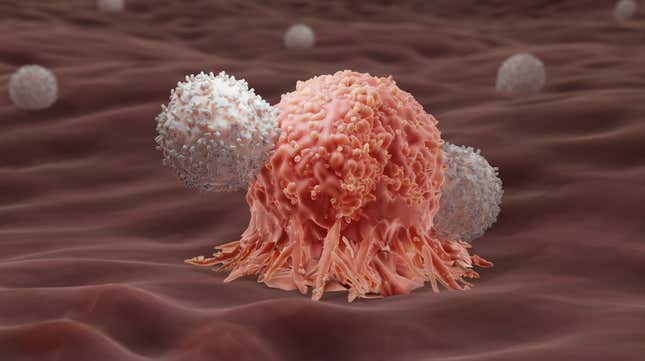
A relatively new cancer treatment known as CAR T cell therapy is perhaps more dangerous than we knew. The Food and Drug Administration found evidence that the treatment can potentially raise the risk of secondary cancers and is telling makers of these products to add a boxed warning detailing the risk to their labeling. However, the FDA still says that the positives of CAR T therapy outweigh the potential negatives.
CAR T cell therapy is a form of immunotherapy that aims to boost the immune system’s defenses against cancer. It works by extracting and then genetically modifying a person’s T cells (a type of white blood cell) in the lab to turn them into more potent cancer killers. CAR T is currently only approved to treat specific blood cancers, but it’s had remarkable response rates for cases that were once considered untreatable—upwards of 90%. Researchers are continuing to develop more versatile forms of CAR T, and it may even have potential as a treatment for autoimmune diseases like lupus.
As impressive as CAR T has been, it’s already known to have serious side effects. The enhanced T cells can release an overflow of chemicals called cytokines that systematically damage the body, causing severe, even fatal complications. And in recent years, the FDA has received numerous reports from doctors and researchers linking CAR T to the development of secondary cancers, specifically cancers involving T cells. These reports have come from clinical trials of CAR T products as well as adverse event data following their release to the public.
Last November, the agency announced that it had started a formal investigation into this risk. And since last week, the FDA has sent letters to six makers of CAR T products telling them to include a new boxed warning detailing the possible risk in their products’ labeling.
CAR T is typically used as a last-resort treatment, meaning that patients taking it are already at high risk of severe illness and death from their cancers. So even this added risk of secondary cancer likely won’t be enough to deter doctors and patients from going forward with the therapy. In its November announcement, the FDA stated that the “the overall benefits of these products continue to outweigh their potential risks for their approved uses.”
An important question left unanswered is the exact possibility of this risk, though it appears to be rare. To date, the FDA has received around 25 reports of secondary cancer that it believes could be tied to CAR T, though its investigation has not yet concluded. Meanwhile, over 27,000 doses of CAR T therapy have been given to patients in the U.S since the first approval of a CAR T product in 2017.

